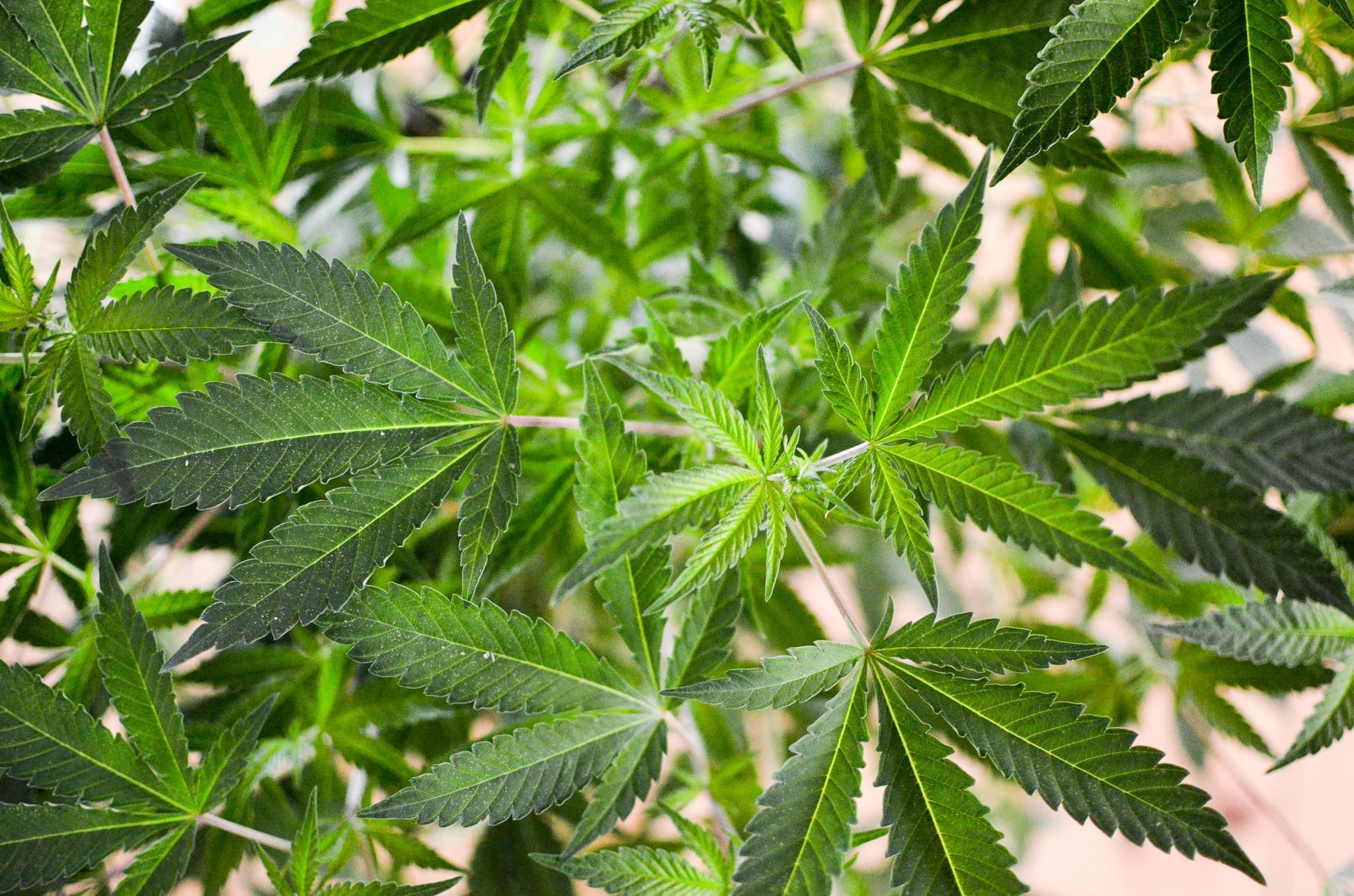featured
Trucking Industry Group Is ‘Deeply Concerned’ About Marijuana Rescheduling’s Potential Impact On Drug Testing For Drivers
Published
18 hours agoon

The American Trucking Associations (ATA) says it’s “deeply concerned” about the potential impact of federal marijuana rescheduling on drug testing programs for drivers—and it’s asking the secretary of the Department of Transportation (DOT) for clarity around the policy change.
In a letter sent to DOT Secretary Sean Duffy on Thursday, ATA’s chief operating officer, Dan Horvath, said the industry group wants “information regarding whether the DOT will retain the authority and capability to test for marijuana use by commercial motor vehicle (CMV) drivers and other safety-sensitive transportation workers” if cannabis is moved from Schedule I to Schedule III of the Controlled Substances Act (CSA).
Of course, that policy hasn’t been enacted yet. And while President Donald Trump said recently he’ll be making a decision on the pending proposal within weeks—after endorsing the reform on the campaign trail last year—it remains to be seen whether he intends to follow through on rescheduling.
Horvath said ATA does “not hold a formal position on marijuana legalization or deregulation,” but “we are deeply concerned about the safety risks of rescheduling marijuana without explicit safeguards to preserve the necessary testing authority and technical requirements for DOT-regulated safety-sensitive workers.”
The concern lies in the potential removal of mandatory federal drug testing guidelines under the U.S. Department of Health and Human Services (HHS) that DOT must currently comply with if cannabis is moved to Schedule III.
“If so, without clear measures to ensure DOT’s program retains–and is equipped to execute–marijuana testing authority, such a federal policy shift could have serious consequences for highway safety and the integrity of the national transportation network,” the letter says. “This risk is exacerbated by the fact that there is currently no proven, widely accepted standard to determine marijuana impairment at roadside or before a driver begins operating a vehicle, making it far more difficult to prevent impaired driving.”
“The risks and potential safety implications of such a gap in testing authority are well-documented,” Horvath said, pointing to data on the rate of positive THC tests among drivers and studies that he claimed demonstrate an increase in traffic fatalities following state-level legalization.
“ATA has repeatedly conveyed these concerns—and our request for clarity on potential impacts to the DOT testing program—to the Department under the previous administration, both through formal letters and in-person discussions,” he wrote in the letter, which was first reported by Transportation Topics.
Horvath also noted that while former Transportation Secretary Pete Buttigieg told a congressional committee last year that rescheduling wouldn’t impact drug testing regulations, ATA “never received a response to our correspondence explaining the basis for this position or detailing how DOT intended to address any impacts to the program.”
“Given the heightened public attention to marijuana policy and the possibility of a federal rescheduling of marijuana in the near term, we are requesting clarity on DOT’s plans to address such a change. Additionally, we urge DOT to proactively coordinate with HHS, [the Department of Justice], and relevant lawmakers to ensure that any federal policy shift preserves the authority, tools, and technical capacity necessary to continue testing DOT-regulated safety-sensitive workers.”
Meanwhile, a policy paper from a pair of companies in the trucking industry that was released in April says the sector was short about 80,000 drivers last year—an issue it asserts was exacerbated by workers testing positive for marijuana under DOT’s strict, zero-tolerance drug policy.
Moving marijuana to Schedule III “could have significant implications for DOT regulations and drug testing protocols,” the paper says—for example, by acknowledging legitimate medical use and potentially reducing social stigma—but it wouldn’t necessarily ease restrictions.
DOT drug screening programs typically use urine-based testing, but the report says that saliva and hair follicle testing offer benefits over that standard. It also notes that there’s “currently no widespread test to determine if a driver is currently under the influence of a drug like THC.”
The department finalized new testing policies in 2023 to allow oral saliva drug testing as an alternative to urine-based tests. Late last year, critics lamented that more than a year and a half after finalizing the rule, federal officials had yet to set up the infrastructure necessary to allow the new testing procedure to be used.
Congressional lawmakers at hearings in March heard from representatives of the trucking industry, who called for wider use of hair-follicle testing in the industry. The chair of the National Transportation Safety Board (NTSB), meanwhile, recommended better education for drivers.
In April, meanwhile, the U.S. Supreme Court ruled in favor of a trucker who sued a cannabis company after he was fired over a positive THC test that he said was caused by consuming a hemp-derived CBD product.
Separately, a Substance Abuse and Mental Health Services Administration (SAMHSA) official downplayed criticism from the CEO of a drug-testing company that more widespread use of saliva-based drug testing “means truckers who use cannabis will be able to do so with near impunity, as long as they avoid a drug test for a couple of days.”
The transportation industry also advised Congress in January that if marijuana is federally rescheduled, businesses want assurances that they won’t have to forgo zero-tolerance drug policies for drivers—while stressing that a key problem for the sector is a lack of technology to detect impaired driving.
A 2023 congressional report for a Transportation, Housing and Urban Development, and Related Agencies (THUD) bill said that the House Appropriations Committee “continues to support the development of an objective standard to measure marijuana impairment and a related field sobriety test to ensure highway safety.”
A year earlier Sen. John Hickenlooper (D) of Colorado sent a letter to the DOT seeking an update on that status of a federal report into research barriers that are inhibiting the development of a standardized test for marijuana impairment on the roads. The department was required to complete the report under a large-scale infrastructure bill signed by then-President Joe Biden, but it missed its reporting deadline.
Meanwhile, National Transportation Safety Board (NTSB) last year warned that marijuana rescheduling could create a “blind spot” with respect to drug testing of federally regulated workers in safety-sensitive positions.
At a House committee hearing, then-DOT Secretary Buttigieg had referenced concerns from ATA “about the broad public health and safety consequences of reclassification on the national highway system and its users,” which the trucking association voiced in a letter to the secretary.
Current federal law mandates that commercial drivers abstain from cannabis, subjecting them to various forms of drug screening, from pre-employment to randomized testing.
In June 2022, meanwhile, an ATRI survey of licensed U.S. truck drivers found that 72.4 percent supported “loosening” cannabis laws and testing policies. Another 66.5 percent said that marijuana should be federally legalized.
Cannabis reform advocates, meanwhile, have also called on federal officials to change what they call “discriminatory” drug testing practices around the trucking industry.
A top Wells Fargo analyst said in 2022 that there’s one main reason for rising costs and worker shortages in the transportation sector: federal marijuana criminalization and resulting drug testing mandates that persist even as more states enact legalization.
Then-Rep. Earl Blumenauer (D-OR) sent a letter to the head of DOT in 2022, emphasizing that the agency’s policies on drug testing truckers and other commercial drivers for marijuana are unnecessarily costing people their jobs and contributing to supply chain issues.
The 2022 ATRI report noted that research into the impact of cannabis use on driving and highway safety is currently mixed, complicating rulemaking to address the issue. A separate 2019 report from the Congressional Research Service (CRS) similarly found that evidence about cannabis’s ability to impair driving is inconclusive.
Read ATA’s letter on marijuana rescheduling and drug testing below:

Author: mscannabiz.com
MScannaBIZ for all you Mississippi Cannabis News and Information.
You may like
-


Two Oakland cannabis dispensaries targeted again by ram-raiding burglars
-


Trump on changes to marijuana policy: 'We're looking at it'
-


Bill Maher Takes Credit for Possibility Trump Might Reshedule Marijuana
-


Social cannabis use rules will be published Friday
-


Over 2,000 plants uncovered at marijuana grow-op in Brantford – CP24
-


Mass. residents sound off on social marijuana use as rules are finalized – NBC Boston
featured
Newly Posted Texas Medical Marijuana Rules Will Let Doctors Recommend New Qualifying Conditions For Patients
Published
10 hours agoon
August 15, 2025
Texas officials are taking another step toward implementing a law to significantly expand the state’s medical marijuana program—posting a draft of proposed rules to let physicians recommend new qualifying conditions for cannabis and create standards for allowable inhalation devices.
The state Health and Human Services Commission is set to formally file the proposed rules next week, and they’ll subsequently be published in the Texas Register, opening up a 31-day public comment period.
This comes about a week after the the Department of Public Safety (DPS) previewed a separate set of rules to increase the number of licensed dispensaries under recently passed legislation.
To comply with the medical marijuana expansion bill that Gov. Greg Abbott (R) signed into law in June, DPS will be formally proposing a future licensing application process, security standards for satellite locations and license revocation parameters.
Meanwhile, the new memo published ahead of a Health and Human Services Commission Executive Council meeting scheduled for Thursday, August 21 outlines additional steps that are being taken.
Specifically, the department is proposing rules that “explain how physicians can request to add medical conditions to the list, set standards for pulmonary inhalation medical devices prescribed under the program, and establish a timeline for reviewing and approving such devices.”
Under the rule, doctors would submit recommended medical cannabis qualifying conditions to the Department of State Health Services (DSHS), which would then forward the recommendation to DPS. That department would be tasked with submitting the request to lawmakers for consideration in the next legislative session.
The rules must be finalized by October 1, 2025.
In addition to increasing the number of dispensaries, revising physician recommendation policies and setting standards for vaping devises, the law signed by the governor also expands the state’s list of medical cannabis qualifying conditions to include chronic pain, traumatic brain injury (TBI), Crohn’s disease and other inflammatory bowel diseases, while also allowing end-of-life patients in palliative or hospice care to use marijuana.
That policy change will be automatically adopted via the enacted statute when the law takes effect on September 1, so it will not require further rulemaking.
DPS, for its part, will ultimately be issuing 12 new licenses for dispensaries across the state. Currently there are only three. The additional licensees will go through a competitive process, with officials prioritizing Texas’s public health regions to optimize access.
The first round of licenses will be awarded to nine of 139 applicants who submitted their forms during an earlier application window in 2023. DPS will select those nine licensees on December 1. The 2023 applicants that didn’t receive a license, as well as any new prospective licensees, will have another shot at getting their license during a second round where awardees will be announced on April 1, 2026.
The 2023 group can still revise their applications up until September 15. New would-be dispensary owners have until that date to submit their applications as well.
The Department of Public Safety has separately previewed future rulemaking to comply with the medical marijuana expansion law.
That includes proposals to establish “security requirements for dispensing organization satellite locations if approved by the department,” creating rules to revoke licenses for dispensaries that fail to dispense cannabis within two years of a license issuance and setting a timeline for “reviewing and taking action on dispensing organization licenses.”
Meanwhile, Texas lawmakers took up a bill on Wednesday that would ban consumable hemp products containing THC. But despite the committee hearing being held, the legislation isn’t expected to advance during an ongoing special session as Democratic state lawmakers continue to deny the House a quorum to pass any measures amid a conflict over proposed redistricting.
The House bill, a companion to an identical Senate-passed hemp proposal, was discussed during a lengthy meeting of the House Public Health Committee, which is able to conduct business despite the broader lack of quorum in the chamber. While the governor has threatened prosecution or dismissal of absent Democratic members, the walkout hasn’t shown signs of relenting.
Time is running short in the special session the governor convened to address a series of outstanding issues, including legislation related to hemp cannabinoid products. Abbott vetoed an earlier version of the controversial ban that passed during this year’s regular session, and he recently outlined what he’d like to see in a revised version of the bill.
The governor and legislative leaders have since affirmed that, if Democrats members don’t show up and establish a quorum by Friday, they will end the current special session and start a new one. Under the state constitution, special sessions cannot last longer than 30 days, but there is no limit to how many can be called.
At a press conference last month, a group of Democratic state senators introduced two new cannabis-related bills, including one that would regulate the hemp market, allowing adults 21 and older to purchase hemp products containing no more than 5 mg of THC per serving.
A second new bill would effectively legalize cannabis for adult use by removing criminal penalties for possession of up to two ounces of marijuana on a person and up to 10 ounces in a single household if it’s secure and out of sight. Cultivation of up to six plants, only half of which could be mature, would also be legalized.
The governor, who during the state’s regular legislative session this year vetoed a similar hemp product ban, SB 3, has also backed the idea of limiting THC potency and prohibiting sales to minors rather than outlawing products entirely.
Under the current Senate-passed proposal, consumable hemp products with any amount of THC—or any other cannabinoid besides CBD and CBG—would be illegal. Even mere possession would be punishable as a Class B misdemeanor, carrying up to 180 days in jail and a $2,000 fine.
Some advocates are hopeful that either SB 5 or its House counterpart could see revisions as they make their way through the legislative process—either to affirmatively regulate the hemp market or to at least ease some of the criminal penalties on individuals found in possession of the affected products.
—
Marijuana Moment is tracking hundreds of cannabis, psychedelics and drug policy bills in state legislatures and Congress this year. Patreon supporters pledging at least $25/month get access to our interactive maps, charts and hearing calendar so they don’t miss any developments.![]()
Learn more about our marijuana bill tracker and become a supporter on Patreon to get access.
—
Separately, Rep. Nicole Collier (D) introduced a one-page bill, HB 42, designed to protect consumers in the state from criminal charges if what they believed was a legal hemp product turned out to contain excessive amounts of THC, making it illegal marijuana. It would prevent the criminalization of someone found in possession of a product that’s labeled as hemp but is determined to contain “a controlled substance or marihuana.”
In order for the person to obtain the legal protection, the product would need to have been purchased “from a retailer the person reasonably believed was authorized to sell a consumable hemp product.”
Another bill—HB 195, introduced by Rep. Jessica González (D)—would legalize marijuana for people 21 and older, allowing possession of up to 2.5 ounces of cannabis, with no more than 15 grams of that amount being in concentrated form.
Yet another proposal would order state officials to conduct a study on testing for THC intoxication.
As for what Texans themselves want to see from their representatives, proponents of reining in the largely unregulated intoxicating hemp industry in Texas shared new polling data indicating that majorities of respondents from both major political parties support outlawing synthetic cannabinoids, such as delta-8 THC.
The survey also found that respondents would rather obtain therapeutic cannabis products through a state-licensed medical marijuana program than from a “smoke shop selling unregulated and untested hemp.”
Ahead of the governor’s veto in June of SB 3—the earlier hemp product ban—advocates and stakeholders had delivered more than 100,000 petition signatures asking Abbott to reject the measure. Critics argued that the industry—which employs an estimated 53,000 people—would be decimated if the measure became law.
Photo courtesy of Philip Steffan.

Author: mscannabiz.com
MScannaBIZ for all you Mississippi Cannabis News and Information.

The age old search for youth may have a new direction – marijuana
The fight to stay young and healthy has been going on for hundreds if not thousands of years. Billions have been spent, but now there is a new twist – can cannabis help make the brain younger. In the age of biohacking and wellness trends, millennials juggling Zoom fatigue and daily stress are asking: can cannabis do more than chill us out—might it actually make our brains feel younger?
RELATED: Marijuana Might Be A Better Hurricane Party Guest
Preclinical research has shown striking results: in older mice, low-dose THC boosted synaptic connectivity and improved memory, seemingly reversing age-linked cognitive decline.
On the human front, a controlled trial at Johns Hopkins and Tufts used dronabinol—a synthetic THC—in 75 Alzheimer’s patients experiencing agitation. Over three weeks, a twice-daily 5 mg dose reduced agitation by about 30% and was better tolerated than traditional antipsychotics.

However, when it comes to cognitive effects in healthy or aging adults, the data is more mixed. A JAMA Network Open study tracked 57 new medical cannabis users for a year using fMRI scans. The result? No meaningful changes in working memory, reward processing, or inhibitory control—good news for safety-minded users.
But another large-scale imaging study found among young adults (ages 22–36), heavy cannabis users showed reduced brain activation during working memory tasks—63% in lifetime users and 68% in recent users.
Long-term studies add nuance: a Danish cohort study followed over 5,000 men from young adulthood to their 60s and found no greater cognitive decline among cannabis users—in fact, users showed slightly less IQ decline than non-users
RELATED: Science Says Medical Marijuana Improves Quality Of Life
What Does It All Mean for the average person?
-
Dronabinol may soothe brain agitation in Alzheimer’s patients—a meaningful bump in quality of life for patients and caregivers Johns Hopkins Medicine.
-
Medical cannabis over a year doesn’t appear to disrupt key cognitive functions in healthy adults, based on fMRI measures.
-
Heavy recreational use, especially among the younger crowd, may impair working memory and brain activity in imaging studies
-
Long-term cognitive aging trends may not suffer—and could potentially fare better—in users, according to a large Danish study.
While animal studies highlight a fascinating possibility—THC under tightly controlled, low doses might rewind aspects of brain aging— human trials are still in early stages. For Alzheimer’s-related agitation, synthetic THC shows real promise. For healthy adults, cannabis appears neurologically safe over a year. Yet, heavy habitual use—particularly among younger individuals—may carry cognitive costs. Conversely, long-term cognitive aging does not seem accelerated among users—and might even be subtly mitigated.

Author: mscannabiz.com
MScannaBIZ for all you Mississippi Cannabis News and Information.
featured
Klutch Cannabis Opening 5th Ohio Dispensary in Northfield
Published
12 hours agoon
August 15, 2025
[PRESS RELEASE] – NORTHFIELD VILLAGE, Ohio, Aug. 15, 2025 – Klutch Cannabis, one of Ohio’s leading vertically integrated cannabis companies, announced the grand opening of its newest dispensary, located at 10650 Northfield Road in Northfield Village, Ohio. Doors will officially open at 10 a.m. Aug. 21, 2025.
The new location marks Klutch’s first dispensary in Summit County, where the company is headquartered. Conveniently situated directly across the street from the MGM Northfield Park Casino and Racetrack, the dispensary is easily accessible from Route 8 and I-271, finally bringing much-needed access to medical cannabis patients and adult-use consumers in Northern Summit County communities, including Northfield Village, Macedonia, Northfield Center Township, Twinsburg, Hudson, Sagamore Hills, Boston Township, Richfield Township, Bath Township, and more.
The expansion further solidifies Klutch’s retail footprint in Northeast Ohio and represents an important milestone as the company begins delivering its renowned top-shelf products on its home turf. Offerings will include exclusive drops and limited releases along with customer favorites from the company’s Klutch Cannabis and Habitat by Klutch lines, its Ohio-exclusive brand partners, and other Ohio cannabis companies. The Northfield dispensary will also feature Klutch’s signature aesthetic and exceptional customer service, as well as a convenient drive-thru pickup window for pre-orders.
Hours of operation for the new Northfield Village location will be:
- 10 a.m. to 10:45 p.m. Thursday through Saturday
- 10 a.m. to 10 p.m. Sunday through Wednesday
“We’re incredibly excited to expand Klutch Cannabis’s retail footprint to Summit County,” Klutch founder and CEO Adam Thomarios said. “This location has been years in the making and will finally provide patients and adult-use customers in Northern Summit County with access to the quality, care, and consistency that Klutch is known for. Our thanks go out, especially, to the community, administration, and officials in Northfield Village for being such great partners from the start. The Village is a great place to do business, and we can’t wait to start making a positive impact in the community.”
For more information about Klutch Cannabis, its dispensaries, and its award-winning products, visit KlutchCannabis.com and HabitatbyKlutch.com or follow @KlutchxCommunity and @HabitatbyKlutch on Instagram.

Author: mscannabiz.com
MScannaBIZ for all you Mississippi Cannabis News and Information.

Two Oakland cannabis dispensaries targeted again by ram-raiding burglars

Trump on changes to marijuana policy: 'We're looking at it'

Bill Maher Takes Credit for Possibility Trump Might Reshedule Marijuana

Social cannabis use rules will be published Friday

Over 2,000 plants uncovered at marijuana grow-op in Brantford – CP24

Mass. residents sound off on social marijuana use as rules are finalized – NBC Boston

Newly Posted Texas Medical Marijuana Rules Will Let Doctors Recommend New Qualifying Conditions For Patients

MNPD seizes pounds of marijuana, arrests man with 7 outstanding warrants

Can Cannabis Help Make The Brain Younger

Klutch Cannabis Opening 5th Ohio Dispensary in Northfield

Undercover video exposes illegal THC sales at North Texas vape shops

Book Review: The Traveling Cannabis Writer’s Guide to America’s Hidden Gems

WKRN: marijuana reclassification impact

Texas Senators Unanimously Pass Hemp THC Ban Bill Hours After Governor Convenes Second Special Session

New York’s cannabis agency allowed dispensaries to open too close to schools | Videos

Texas, California Governors Collide Over Redistricting; Hemp Lies in the Crosshairs

Texas Lawmakers Will Continue Pursuing Hemp Product Restrictions In Second Special Session

Over 2,000 plants uncovered at marijuana grow-op in Brantford

Trucking Industry Group Is ‘Deeply Concerned’ About Marijuana Rescheduling’s Potential Impact On Drug Testing For Drivers

The Best Late Summer Cocktails

#1to3: The Social Media Campaign Urging Trump To Reschedule Cannabis — And How You Can Help

Report Predicts Global Psychedelic Drugs Market Will Reach $22.6B by 2033

New York allowed pot shops to open too close to schools. Now they might have to move

Medical Marijuana ‘Significantly’ Decreases Use Of Opioids By Chronic Pain Patients, New Study Finds

Alert: Department of Cannabis Control updates data dashboards with full data for 2023

Connecticut Appoints The US’s First Cannabis Ombudsperson – Yes there is a pun in there and I’m Sure Erin Kirk Is Going To Hear It More Than Once!

5 best CBD creams of 2024 by Leafly

EU initiative begins bid to open access to psychedelic therapies
New Study Analyzes the Effects of THCV, CBD on Weight Loss

Free delta-9 gummies from Bay Smokes

5 best autoflower seed banks of 2024 by Leafly

Discover New York’s dankest cannabis brands [September 2024]

Curaleaf Start Process Of Getting Their Claws Into The UK’s National Health System – With Former MP (Resigned Today 30/5/24) As The Front Man

May 2024 Leafly HighLight: Pink Runtz strain

Mississippi city official pleads guilty to selling fake CBD products

Press Release: CANNRA Calls for Farm Bill to Clarify Existing State Authority to Regulate Hemp Products

Local medical cannabis dispensary reacts to MSDH pulling Rapid Analytics License – WLBT

Horn Lake denies cannabis dispensary request to allow sale of drug paraphernalia and Sunday sales | News

5 best THC drinks of 2024 by Leafly

Nevada CCB to Accept Applications for Cannabis Establishments in White Pine County – “Only one cultivation and one production license will be awarded in White Pine County”

6 best CBD gummies of 2024 by Leafly

The Daily Hit: October 2, 2024

5 best delta-9 THC gummies of 2024 by Leafly

Weekly Update: Monday, May 13, 2024 including, New Guide for Renewals & May Board meeting application deadline

PRESS RELEASE : Justice Department Submits Proposed Regulation to Reschedule Marijuana

People In This State Googled ‘Medical Marijuana’ The Most, Study Shows

Thailand: Pro-cannabis advocates rally ahead of the government’s plan to recriminalize the plant

5 best THCA flower of 2024 by Leafly
Trending
-

 California Cannabis Updates1 year ago
California Cannabis Updates1 year agoAlert: Department of Cannabis Control updates data dashboards with full data for 2023
-

 Breaking News1 year ago
Breaking News1 year agoConnecticut Appoints The US’s First Cannabis Ombudsperson – Yes there is a pun in there and I’m Sure Erin Kirk Is Going To Hear It More Than Once!
-

 best list1 year ago
best list1 year ago5 best CBD creams of 2024 by Leafly
-

 Business11 months ago
Business11 months agoEU initiative begins bid to open access to psychedelic therapies
-

 cbd1 year ago
cbd1 year agoNew Study Analyzes the Effects of THCV, CBD on Weight Loss
-

 Bay Smokes1 year ago
Bay Smokes1 year agoFree delta-9 gummies from Bay Smokes
-

 autoflower seeds11 months ago
autoflower seeds11 months ago5 best autoflower seed banks of 2024 by Leafly
-

 cannabis brands11 months ago
cannabis brands11 months agoDiscover New York’s dankest cannabis brands [September 2024]




